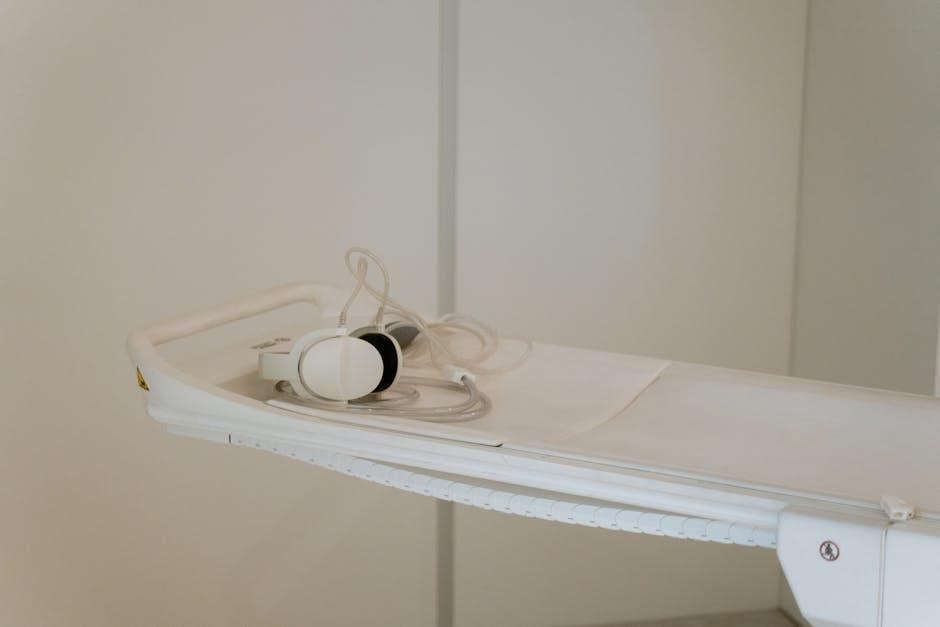MCAT practice tests are essential tools for preparing for the Medical College Admission Test‚ offering realistic simulations and valuable insights to improve readiness and confidence.
1.1 Importance of Practice Tests in MCAT Preparation
Practice tests are crucial in MCAT preparation as they simulate the actual exam experience‚ helping candidates assess their readiness. They identify weaknesses‚ improve time management‚ and enhance problem-solving skills. By reviewing answers‚ students gain insights into their mistakes‚ allowing targeted improvement. Regular practice tests build stamina and reduce test-day anxiety. They also provide a baseline score‚ enabling students to track progress and set realistic goals. Utilizing practice tests with answers is a proven strategy to refine strategies and boost confidence‚ ensuring a stronger performance on the official MCAT.
1.2 Overview of MCAT Exam Structure
The MCAT exam is divided into four sections: Biological and Biochemical Foundations of Living Systems‚ Chemical and Physical Foundations of Biological Systems‚ Critical Analysis and Reasoning Skills‚ and Psychological‚ Social‚ and Biological Foundations of Behavior. Each section includes multiple-choice questions and passages. The exam tests critical thinking‚ problem-solving‚ and knowledge retention. The total duration is approximately 7.5 hours‚ including breaks. Understanding the structure helps candidates prepare effectively‚ focusing on time management and content mastery. This format ensures a comprehensive assessment of skills necessary for medical school success.

Sources for Free MCAT Practice Tests in PDF Format
Free MCAT practice tests in PDF format are available from sources like Princeton Review‚ AAMC‚ and Houston Public Library‚ offering realistic exam simulations and answer keys.
2.1 Princeton Review Free MCAT Practice Exam
The Princeton Review offers a free full-length MCAT practice exam designed to simulate the actual test day experience. This exam includes detailed answer explanations and is accessible upon creating a free account. It also provides a half-length diagnostic test to assess initial performance and a Study Planner tool to organize preparation. Additionally‚ users gain access to 1‚600 customizable flashcards covering high-yield content and Blue‚ the AI MCAT tutor‚ which offers personalized feedback. This comprehensive resource is ideal for candidates aiming to familiarize themselves with the exam format and improve their readiness effectively.
2.2 AAMC Official MCAT Practice Tests
The Association of American Medical Colleges (AAMC) provides official MCAT practice tests that are highly regarded for their accuracy and realism. These tests closely mirror the actual exam in content‚ format‚ and difficulty‚ making them invaluable for preparation. The AAMC offers full-length practice exams with detailed answer explanations‚ allowing test-takers to assess their performance and identify areas for improvement. Additionally‚ the AAMC’s Official Prep Hub includes tools like the Practice with Exam Features‚ which simulates the test interface. These resources are particularly useful for understanding the exam structure and refining strategies before test day.
2.3 MCAT Practice Tests from Houston Public Library
The Houston Public Library offers free access to MCAT practice tests through its digital resources. By creating a free account with a Texas Driver’s License or Rice ID‚ users can access materials like Princeton Review’s MCAT Workout and EBSCO LearningExpress. These platforms provide full-length practice exams‚ diagnostic tests‚ and interactive tools to help candidates assess their performance. The library’s resources also include PDF study guides and question banks with detailed answer explanations‚ making them a valuable resource for test preparation. This access supports a comprehensive review of exam content and strategies.

Benefits of Using MCAT Practice Tests with Answers
Using MCAT practice tests with answers provides realistic test simulations‚ identifies weaknesses‚ and improves performance. Detailed explanations enhance understanding‚ helping candidates master exam content and build confidence effectively.
3.1 Simulating Real Test Day Experience
Simulating real test day experience with MCAT practice tests in PDF format helps candidates familiarize themselves with the exam structure‚ timing‚ and format. By taking full-length tests under timed conditions‚ students can build stamina and reduce anxiety. The realistic setup allows them to practice time management and pacing‚ ensuring they adhere to the strict time limits for each section. This simulation also helps identify areas where they may need to improve‚ such as rushing through questions or spending too much time on a single passage. Additionally‚ the detailed answer explanations provided in the PDFs enable students to review their performance and understand their mistakes‚ reinforcing their learning and preparation. This immersive practice fosters a sense of readiness‚ making the actual test day feel more manageable and less intimidating.
3.2 Identifying Weaknesses and Improving Performance
MCAT practice tests with answers are invaluable for identifying weaknesses and improving performance. By reviewing detailed explanations‚ students can understand where they went wrong and why. This process highlights gaps in knowledge and areas needing more focus. Regularly analyzing performance helps track progress and refine study strategies. Additionally‚ practice tests reveal patterns in errors‚ allowing students to target specific topics or question types. Over time‚ this targeted approach leads to significant improvement in accuracy and overall scores‚ ensuring a stronger performance on the actual exam.
3.3 Building Time Management and Stamina
MCAT practice tests with answers are crucial for building time management skills and stamina. By simulating real exam conditions‚ students learn to allocate time effectively across sections. Regular practice helps develop the endurance needed for the 7.5-hour test. Analyzing performance reveals areas where time is mismanaged‚ allowing for strategy adjustments. Consistent exposure to full-length tests enhances speed and accuracy‚ ensuring readiness for the actual exam. This iterative process strengthens test-taking stamina‚ enabling students to maintain focus and perform optimally throughout the entire exam duration.

How to Effectively Use MCAT Practice Tests
Effectively using MCAT practice tests involves simulating exam conditions‚ reviewing mistakes‚ and tracking progress. Utilize answer explanations to enhance understanding and refine test-taking strategies for better scores.
4.1 Creating a Study Plan with Practice Tests
Integrating MCAT practice tests into your study plan helps identify strengths and weaknesses. Start with diagnostic tests to assess baseline performance‚ then schedule regular full-length exams to simulate test-day conditions. Use the detailed answer explanations to focus on areas needing improvement. Allocate specific study periods for each section‚ ensuring a balanced approach. Track progress by reviewing scores and adjusting the plan as needed. Consistency is key; aim to take at least one practice test monthly‚ increasing frequency as the exam approaches to build stamina and confidence effectively.
4.2 Reviewing Answer Explanations for Better Understanding
Reviewing answer explanations is crucial for understanding concepts and improving performance. After taking a practice test‚ analyze both correct and incorrect answers to identify knowledge gaps. Detailed explanations in MCAT practice test PDFs provide insights into problem-solving strategies and common mistakes. Use this information to refine study strategies and focus on weak areas. Additionally‚ explanations often highlight high-yield topics‚ helping prioritize efforts. Regular review of explanations enhances critical thinking and ensures mastery of challenging material‚ ultimately boosting confidence and readiness for the actual exam.

Scoring and Interpreting MCAT Practice Tests
MCAT scoring ranges from 472 to 528‚ with each section scored individually. Understanding your score helps identify strengths and weaknesses. Use this data to set realistic improvement goals and track progress effectively.
5.1 Understanding the Scoring System
The MCAT scoring system assigns scores ranging from 472 to 528. Each section (Biological and Biochemical Foundations‚ Chemical and Physical Foundations‚ and Critical Analysis and Reasoning Skills) is scored from 118 to 132. The total score is the sum of these sections. A 500 is the average. Practice tests with answers provide detailed explanations‚ helping you understand your strengths and weaknesses. By analyzing your scores‚ you can identify areas needing improvement. This data is crucial for setting realistic goals and tracking progress effectively.
5.2 Setting Benchmarks for Improvement
Setting benchmarks is crucial for tracking progress and staying motivated. Start by taking a baseline practice test to identify your current score. Use this as a starting point to set realistic goals. Aim to improve by 1-2 points in each section with each subsequent test. Regularly review your scores to measure growth and adjust your study plan accordingly. Focus on addressing weak areas highlighted by your performance. By consistently setting and achieving benchmarks‚ you can build confidence and ensure steady progress toward your target score. Utilize practice tests with answers to refine your strategy effectively.
MCAT practice tests are vital for achieving success. Regular use of high-quality resources‚ like those in PDF format with answers‚ ensures comprehensive preparation and confidence on test day.
6.1 Final Tips for Maximizing Practice Test Benefits
To maximize the benefits of MCAT practice tests‚ simulate real test conditions‚ including timing and environment. Review answer explanations thoroughly to understand mistakes. Focus on improving weak areas identified through practice. Utilize PDF resources with answers for convenient study sessions. Track progress over time to monitor improvement. Stay consistent with practice to build stamina and confidence. Incorporate feedback from each test into your study plan. By following these strategies‚ you can effectively use practice tests to achieve your target score and excel on exam day.

